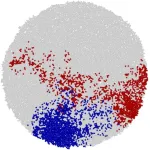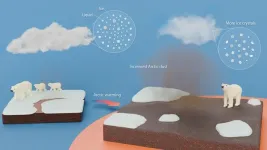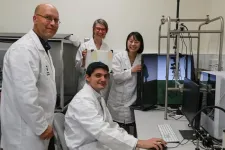(Press-News.org) Researchers at the University of Cologne and the Centre for Genomic Regulation (CRG) in Barcelona have discovered that cancer grows uniformly throughout its mass, rather than at the outer edges. The work, published today in the journal eLIFE, challenges decades-old assumptions about how the disease grows and spreads.
“We challenge the idea that a tumour is a ‘two-speed’ entity with rapidly dividing cells on the surface and slower activity in the core. Instead, we show they are uniformly growing masses, where every region is equally active and has the potential to harbour aggressive mutations,” says Dr. Donate Weghorn, co-corresponding author of the study and researcher at the Centre for Genomic Regulation in Barcelona.
“Our findings have implications for tumour evolution. The constant churn of cells dying and being replaced by new ones throughout the tumour volume gives cancer many opportunities for evolutionary innovations, such as escaping from immune surveillance,” explains Prof. Johannes Berg, co-corresponding author of the study and researcher at the University of Cologne.
For the last fifty years, researchers have hypothesised that tumours grow faster at their outer edges. Cancer cells on the surface are thought to have natural advantages compared to cells deep within. For example, peripheral cells have better access to nutrients and oxygen from surrounding healthy tissues. They can also get rid of their waste more easily.
As a tumour grows, its centre gets further and further away from the blood vessels in the area where it is growing. The cells in a tumour’s core get less and less oxygen and nutrients. The cells are also under more mechanical pressure, with compression limiting their ability to divide.
Despite this theory, the study found tumours grow throughout their mass. The researchers made the discovery thanks to spatial genomics, a technique used to study the genetic information of cells in their exact locations within a tissue. They obtained data from previous studies where hundreds of small samples were taken from different parts of liver tumours, both in two- and three-dimensional space. This provided a detailed map of the mutations throughout the tumour.
They looked at the mutations in each of the samples, and developed a method to measure the direction and spread of these mutations, allowing the researchers to calculate the angles between the positions of parent cells and their mutated offspring. In the surface growth model, these angles would point outwards. Instead, the researchers found the angles were spread evenly in all directions, showing uniform growth throughout the tumour.
The study also looked at how mutations were spread within the tumour. If cancer cells grew mostly at the edges, mutations would be more clustered. They found that mutations were spread out, suggesting that cells were dividing all over the tumour.
To validate their findings further, the researchers used computer simulations to create different virtual tumours, some with surface growth and others with volume growth. The researchers compared the patterns of mutations from the simulations to the patterns found in the real tumour data. They found that mutation patterns in the real tumours matched the patterns from the volume growth simulations but not the surface growth simulations.
One of the limitations of the study is that it focused on liver cancer, so the findings might not apply universally to all types of cancer. Another limitation is that the study mainly provides insights into the early stages of tumour growth, which might not fully capture the behaviour of larger or metastatic types of cancer.
“The emergence of mutants that confer resistance to therapy are an important aspect of clinical relevance. Our work focuses on early-stage tumour growth, but expanding the research to late-arising mutations can tell us more about those mutations and why they ultimately foil many therapeutic approaches,” concludes Dr. Berg.
END
Cancers grow uniformly throughout their mass
New research challenges the idea that tumors are ‘two-speed’ entities
2024-11-26
ELSE PRESS RELEASES FROM THIS DATE:
Researchers show complex relationship between Arctic warming and Arctic dust
2024-11-26
The Arctic is warming two to four times faster than the global average. A recent study by researchers in Japan found that dust from snow- and ice-free areas of the Arctic may be an important contributor to climate change in the region. The findings were published in the journal npj Climate and Atmospheric Science.
According to one view, higher temperatures in the Arctic are thought to lead to the region's clouds containing more liquid droplets and fewer ice crystals. Clouds become thicker, longer lasting, ...
Brain test shows that crabs process pain
2024-11-26
Researchers from the University of Gothenburg are the first to prove that painful stimuli are sent to the brain of shore crabs providing more evidence for pain in crustaceans. EEG style measurements show clear neural reactions in the crustacean's brain during mechanical or chemical stimulation.
In the search for a better welfare of animals that we humans kill for food, researchers at the University of Gothenburg have chosen to focus on decapod crustaceans. This includes shellfish delicacies such as prawns, lobsters, crabs and crayfish that we both catch wild and farm. Currently, ...
Social fish with low status are so stressed out it impacts their brains
2024-11-26
Social stress is bad for your brain. It’s a prime suspect in the accumulation of oxidative stress in the brain, which is believed to contribute to mental health and neurodegenerative disorders — but the mechanisms that turn social stress into oxidative stress, and how social status affects this, are poorly understood. By studying a highly social, very hierarchical fish species, cichlids, scientists have now found that social stress raises oxidative stress in the brains of low-status fish.
“We found that low rank was generally linked to higher levels of oxidative stress in the brain,” said Dr Peter Dijkstra of ...
Predicting the weather: New meteorology estimation method aids building efficiency
2024-11-26
Due to the growing reality of global warming and climate change, there is increasing uncertainty around meteorological conditions used in energy assessments of buildings. Existing methods for generating meteorological data do not adequately handle the interdependence of meteorological elements, such as solar radiation, air temperature, and absolute humidity, which are important for calculating energy usage and efficiency.
To address this challenge, a research team at Osaka Metropolitan University’s Graduate School of Human Life and Ecology—comprising Associate ...
Inside the ‘swat team’ – how insects react to virtual reality gaming
2024-11-26
Humans get a real buzz from the virtual world of gaming and augmented reality but now scientists have trialled the use of these new-age technologies on small animals, to test the reactions of tiny hoverflies and even crabs.
In a bid to comprehend the aerodynamic powers of flying insects and other little-understood animal behaviours, the Flinders University-led study is gaining new perspectives on how invertebrates respond to, interact with and navigate virtual ‘worlds’ created by advanced entertainment technology.
Published in the ...
Oil spill still contaminating sensitive Mauritius mangroves three years on
2024-11-26
Three years after bulk carrier MV Wakashio ran aground on a coral reef off Mauritius, spilling 1000 tonnes of a new type of marine fuel oil, Curtin University-led research has confirmed the oil is still present in an environmentally sensitive mangrove forest close to important Ramsar conservation sites.
Lead researcher Dr Alan Scarlett, from Curtin’s WA Organic and Isotope Geochemistry Centre in the School of Earth and Planetary Sciences, said the chemical ‘fingerprint’ of the oil found ...
Unmasking the voices of experience in healthcare studies
2024-11-26
Researchers are calling for a formal process that recognises and acknowledges the invaluable contributions of those with lived experience in healthcare research.
New research by Flinders University published in the Patient Education and Counselling journal exposes underlying issues in academic engagement and calls for better processes to credit those with lived experiences.
“With the growing awareness of the importance of diversity and inclusion in research, it is time for the research community to monitor not only how often, but also how well people with lived experience are involved,” says Associate Professor Elizabeth Lynch.
Associate Professor Lynch from the College of ...
Pandemic raised food, housing insecurity in Oregon despite surge in spending
2024-11-26
Despite a heavy infusion of public and private support during the COVID-19 pandemic, Medicaid and Medicare beneficiaries in Oregon reported that housing and food insecurity shot up during the onset of the pandemic in March of 2020 — and their basic needs remained in doubt through at least the end of the following year.
The survey data were reported in a study led by Oregon Health & Science University and published today in the Annals of Family Medicine.
The Oregon study provides a state-specific dimension to a nationwide survey ...
OU College of Medicine professor earns prestigious pancreatology award
2024-11-26
Min Li, Ph.D., a George Lynn Cross Professor of Medicine, Surgery and Cell Biology at the University of Oklahoma College of Medicine and Associate Director for Global Oncology at OU Health Stephenson Cancer Center, will receive the 2024 Palade Prize from the International Association of Pancreatology.
The Palade Prize, the IAP’s most distinguished award for research excellence, recognizes Li’s contributions to the field of pancreatology, which is dedicated to discovering new methods of identifying, diagnosing and treating diseases of the pancreas such as pancreatic ...
Sub-Saharan Africa leads global HIV decline: Progress made but UNAIDS 2030 goals hang in balance, new IHME study finds
2024-11-26
**Embargo: 23.30 [UK time], 6:30 p.m. [ET], 3:30 p.m. [PT], Monday, November 25 2024**
In contrast, the percentage of the population without a suppressed level of HIV (PUV) increased by 116.1% in Central Europe, Eastern Europe, and Central Asia from 2003 to 2021.
The study authors are issuing recommendations to invigorate the global HIV response across global public health programs dedicated to HIV control and expansion of prevention services.
The Institute for Health Metrics and Evaluation (IHME) has published a new study in The Lancet HIV journal that revealed significant progress in the global fight against HIV/AIDS, alongside ...
LAST 30 PRESS RELEASES:
How some skills become second nature
SFU study sheds light on clotting risks for female astronauts
UC Irvine chemists shed light on how age-related cataracts may begin
Machine learning reveals Raman signatures of liquid-like ion conduction in solid electrolytes
Children’s Hospital of Philadelphia researchers emphasize benefits and risks of generative AI at different stages of childhood development
Why conversation is more like a dance than an exchange of words
With Evo 2, AI can model and design the genetic code for all domains of life
Discovery of why only some early tumors survive could help catch and treat cancer at very earliest stages
Study reveals how gut bacteria and diet can reprogram fat to burn more energy
Mayo Clinic researchers link Parkinson's-related protein to faster Alzheimer's progression in women
Trends in metabolic and bariatric surgery use during the GLP-1 receptor agonist era
Loneliness, anxiety symptoms, depressive symptoms, and suicidal ideation in the all of us dataset
A decision-support system to personalize antidepressant treatment in major depressive disorder
Thunderstorms don’t just appear out of thin air - scientists' key finding to improve forecasting
Automated CT scan analysis could fast-track clinical assessments
New UNC Charlotte study reveals how just three molecules can launch gene-silencing condensates, organizing the epigenome and controlling stem cell differentiation
Oldest known bony fish fossils uncover early vertebrate evolution
High‑performance all‑solid‑state magnesium-air rechargeable battery enabled by metal-free nanoporous graphene
Improving data science education using interest‑matched examples and hands‑on data exercises
Sparkling water helps keep minds sharp during long esports sessions
Drone LiDAR surveys of abandoned roads reveal long-term debris supply driving debris-flow hazards
UGA Bioinformatics doctoral student selected for AIBS and SURA public policy fellowship
Gut microbiome connected with heart disease precursor
Nitrous oxide, a product of fertilizer use, may harm some soil bacteria
FAU lands $4.5M US Air Force T-1A Jayhawk flight simulator
SimTac: A physics-based simulator for vision-based tactile sensing with biomorphic structures
Preparing students to deal with ‘reality shock’ in the workplace
Researchers develop beating, 3D-printed heart model for surgical practice
Black soldier fly larvae show promise for safe organic waste removal
People with COPD commonly misuse medications
[Press-News.org] Cancers grow uniformly throughout their massNew research challenges the idea that tumors are ‘two-speed’ entities






